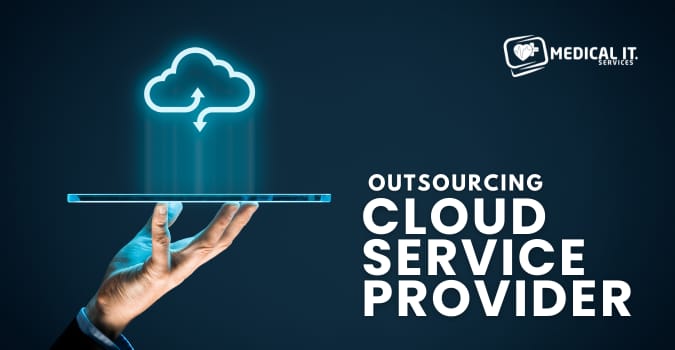In today's fast-paced environment, the Information Technology (IT) sector stands out as one of the…

Factors To Consider When Outsourcing Cloud Service Provider
The integration of cloud services into medical practices has revolutionized the healthcare industry, offering enhanced data management, accessibility, and scalability. However, the decision to outsource a cloud service provider for a medical practice necessitates a comprehensive evaluation of technical aspects. In this blog post, we outline the key factors that medical practitioners and IT administrators should consider when selecting a cloud service provider for their medical practice.
Selecting the Perfect Cloud Service Provider
Due to the sensitive nature of healthcare data, finding the best cloud service provider for a medical center is a critical decision that involves various considerations. Here’s a step-by-step guide to help you choose the right cloud solution company:
Data Security and Compliance:
The paramount concern for healthcare practices is the security and compliance of patient data. Ensure that the cloud service provider adheres to industry standards such as HIPAA, GDPR, or relevant regional regulations. Encryption protocols, data segregation, and robust access controls are imperative to safeguard sensitive patient information.
Healthcare Experience and Expertise:
Opt for a cloud service provider with a proven track record in serving the healthcare sector. Industry-specific knowledge ensures that the provider understands the unique requirements of medical practices, from electronic health record (EHR) systems to medical imaging storage, enabling smoother implementation and management.
Data Backup and Disaster Recovery:
Unforeseen data loss can have severe consequences in healthcare. Evaluate the provider’s backup frequency, retention policies, and disaster recovery mechanisms. The ability to restore critical patient data swiftly and accurately is non-negotiable.
Scalability and Performance:
Medical practices experience varying data loads due to patient influx and operational fluctuations. A cloud provider should offer scalable solutions that accommodate these changes without compromising performance. Load balancing, auto-scaling, and efficient resource allocation are essential considerations.
Network Infrastructure and Uptime:
Reliable network infrastructure is pivotal to seamless medical operations. Assess the provider’s data centers, their geographic distribution, and connectivity options. Additionally, inquire about their uptime guarantees and the measures in place to minimize downtime.
Interoperability and Integration:
Medical practices rely on a multitude of software systems, from EHR platforms to billing solutions. The cloud service provider should support seamless integration with existing applications, enabling data flow and minimizing disruptions during migration.
Comprehensive SLAs and Support:
A well-defined Service Level Agreement (SLA) outlines the provider’s commitments and support provisions. Ensure that the SLA covers parameters such as response times, issue resolution, and technical support availability, especially during critical situations.
Geographical Data Residency:
Data sovereignty and residency laws vary by region. If applicable, select a provider that offers data centers within the same legal jurisdiction as the medical practice. This ensures compliance with regional data protection regulations.
Vendor Lock-In Mitigation:
To prevent dependency on a single cloud provider, assess the feasibility of migrating data and applications to alternative platforms. A provider that adheres to open standards and facilitates data portability can mitigate vendor lock-in risks.
Cost Management and Transparency:
Cloud service costs can accrue quickly. Scrutinize the provider’s pricing structure, billing transparency, and potential hidden charges. Opt for a model that aligns with the medical practice’s budget and optimizes cost-efficiency.
Summary:
Selecting a cloud service provider for a medical practice is a technical decision with profound implications for patient care, data security, and operational efficiency. By evaluating potential providers based on data security, scalability, interoperability, and other technical factors, medical practices can make an informed choice that empowers them to leverage cloud technology while maintaining the highest standards of healthcare service.
Leveraging Cloud Services to Accelerate Healthcare Innovation
If you’re ready to take the next step towards a seamlessly managed cloud solution, consider partnering with MedicalIT.Services. Our expertise in fully managed cloud services tailored to the medical field ensures a reliable and secure infrastructure that aligns perfectly with your practice’s needs and compliance requirements. Make the transition today and experience the benefits of a well-managed and technologically advanced healthcare environment.
Also Read:




